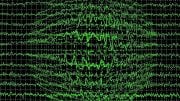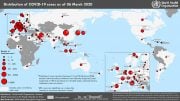
A new study has found that the risk of developing seizures or epilepsy is higher in the six months after a COVID-19 infection compared to an influenza infection. The increased risk is more pronounced in children and in those who did not need hospitalization for COVID-19 infections.
People who have a COVID-19 infection are more likely to develop seizures or epilepsy within the next six months than people who have an influenza infection. Furthermore, the increased risk was more noticeable in children than adults. It was also more noticeable in people who did not need hospitalization for COVID-19 infections. This is according to a study published in the November 16, 2022, online issue of Neurology, the medical journal of the American Academy of Neurology.
“While the overall risk of developing seizures or epilepsy was low—less than 1% of all people with COVID-19, given the large number of people who have been infected with COVID-19, this could result in increases in the number of people with seizures and epilepsy,” said study author Arjune Sen, MD, PhD, of the University of Oxford in England. “In addition, the increased risk of seizures and epilepsy in children gives us another reason to try to prevent COVID-19 infections in kids.”
Recognizing Seizures
Seizures may look different from what you’d expect. In the movies and on TV, a person supposedly having a seizure is often shown falling to the ground, shaking, and becoming unaware of what’s going on around them. Although that is one kind of seizure, it’s not the most common. A person having a seizure is more likely to appear confused, stare into space, wander, make unusual movements, or be unable to answer questions or talk. Some people with seizures have sensations such as an odd taste or smell or a “weird feeling” in their stomach.
Researchers examined a health records network for people with COVID-19 infections for the study. These patients were matched to people who were diagnosed with influenza during the same time period and who were similar in age, sex, and other factors, such as other medical conditions. None of the participants had previously been diagnosed with epilepsy or recurrent seizures. The investigators then analyzed the records to see whether people developed epilepsy or seizures in the following six months.
In each of the COVID-19 and influenza groups, there were 152,754 people.
People who had COVID-19 were 55% more likely to develop epilepsy or seizures over the next six months than people who had influenza. The rate of new cases of epilepsy or seizures was 0.94% in the people who had COVID-19, compared to 0.60% in those who had influenza.
“People should interpret these results cautiously since the overall risk is low,” Sen said. “We do, however, recommend that health care professionals pay particular attention to individuals who may have more subtle features of seizures, such as focal aware seizures, where people are alert and aware of what is going on, especially in the three months following a less severe COVID-19 infection.”
A limitation of the study was that researchers were unable to identify which specific virus variants people were infected with, which could have influenced results.
Reference: “Incidence of Epilepsy and Seizures Over the First 6 Months After a COVID-19 Diagnosis: A Retrospective Cohort Study” by Maxime Taquet, Orrin Devinsky, J. Helen Cross, Paul J Harrison and Arjune Sen, 16 November 2022, Neurology.
DOI: 10.1212/WNL.0000000000201595
The study was supported by the British National Institute for Health and Care Research Oxford Health Biomedical Research Centre.









Be the first to comment on "Risk of Seizures Is Higher After COVID-19 Than After Influenza – Especially in Children"